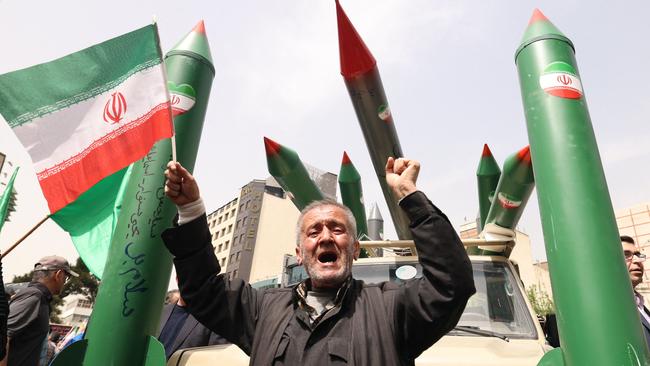Iran ‘may offer interim deal ahead of nuclear talks’
Tehran is reportedly considering offering to suspend some of Iran’s uranium enrichment activity, and allow UN inspectors more access to Iran’s nuclear facilities, before envoys meet US officials.

Tehran is reportedly considering suggesting an interim deal to the United States before scheduled talks on Iran’s nuclear program begin in Oman on Saturday (local time).
The Axios news site reports that the Iranians believe it would be difficult to reach a nuclear deal in the two month deadline suggested by Donald Trump, and an interim agreement would get them more time on the clock before the US President’s threatened escalation.
Mr Trump on Thursday (AEST) said military action was “absolutely” possible if the talks fail, adding that Israel would lead any strikes against Iran.
They will suggest suspending some of Iran’s uranium enrichment activity, and allowing UN inspectors more access to Iran’s nuclear facilities, Axios reports.
Analysts told the news site these steps would only slightly increase Iran’s timeline for developing a nuclear bomb, but could help build trust between the two sides.
In return for suspending some activity, Iran would likely demand Mr Trump ease his “maximum pressure” sanctions campaign against Tehran.
The development came amid an increasing war of words between Donald Trump and Iran’s Supreme Leader Ayatollah Ali Khamenei.
As the US President ratcheted up his rhetoric against Iran, a senior adviser to the Ayatollah warned that Iran could expel UN nuclear watchdog inspectors
Rear Admiral Ali Shamkhani’s comments came after US Trump Wednesday failed to rule out military action against Iran in the event the planned talks fail to produce a deal.
“The continuation of external threats and Iran being in a state of military attack may lead to deterrent measures, including expulsion of inspectors from the International Atomic Energy Agency and cessation of co-operation,” Rear Admiral Ali Shamkhani said on X.
“Transfer of enriched materials to secure locations may also be considered,” he added, referring to the country’s uranium enrichment.
In Washington, State Department spokeswoman Tammy Bruce warned Iran against making a misstep.
“The threat of that kind of action, of course, is inconsistent with Iran’s claims of a peaceful nuclear program,” she told reporters.
“Also, expelling IAEA inspectors from Iran would be an escalation and a miscalculation on Iran’s part.”
Iranian Foreign Minister Abbas Araghchi is due to meet US Middle East envoy Steve Witkoff in the Gulf sultanate on Saturday for the talks that Washington has presented as the last chance for a peaceful resolution of Western concerns about Iran’s nuclear program.
Iran has consistently denied seeking to acquire nuclear weapons. US Secretary of State Marco Rubio voiced hope on Thursday that the talks could lead to “peace”.
“We hope that will lead to peace,” Rubio told a meeting of Trump’s cabinet. “We’re hopeful about that.”
On Wednesday, the United States announced new sanctions targeting Iran’s nuclear program ahead of the talks.
In a mainly symbolic move, the US Treasury Department said it was imposing sanctions under additional authorities on five entities including the Atomic Energy Organisation of Iran and one individual.
On Thursday, the US State Department said it was imposing sanctions on Iran’s oil network under Trump’s policy of “maximum pressure” against the country.
Washington already enforces sweeping sanctions on Iran, particularly its nuclear program whose scientists have also been the target of an assassination campaign attributed to Israel.
Iran maintains that it is against direct negotiations with the United States, but has left the door open for indirect talks.
With AFP



To join the conversation, please log in. Don't have an account? Register
Join the conversation, you are commenting as Logout